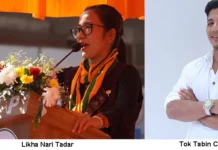Monday Musing
[ M Doley ]
Money plays a key role in determining the shape and results of elections. A candidate who pumps out the most cash generally wins the election.
Aggressive display of wealth, massive rallies, and distribution of freebies are the regular features of election campaigns in India nowadays, and Arunachal Pradesh is no exception to it. Money culture in Arunachal during elections can be attributed to a range of complex socioeconomic factors, besides lack of honesty, integrity and respect for the democratic process.
Additionally, the poor and underprivileged sections of the people, who are struggling to make both ends meet, are more susceptible to offers of cash or other materials in exchange for their votes. Overall, the root cause of money culture in elections in the state is complex and multifaceted.
There is no denying the fact that the poor voters expect freebies and trade their votes for immediate material benefits. When the votes are purchased, the results don’t reflect the will of the citizens but the interest and monetary power of those involved in vote-buying. This unethical practice of using money power to influence the electoral outcomes undermines the democratic principles of free and fair elections.
If reports are to be believed, spending by political parties and candidates to woo voters in the 2019 elections in the country touched a whopping Rs 60,000 crore mark.
New Delhi-based Centre for Media Studies estimated that nearly Rs 100 crore per Lok Sabha constituency was spent during the last Lok Sabha elections in the country.
Money culture in elections contributes to a cycle of corruption and poor governance.
The people must understand that those who buy votes will never serve them. After getting elected as MLAs or MPs, they will focus their first three to four years recouping the expenses of the election campaigns, rather than serving the public interest.
Furthermore, it has become almost impossible for a common man to contest an election due to the mounting election expenses. The high cost associated with elections often leads to the reliance on financial backing from wealthy individuals. The political parties nominate only wealthy candidates who have or can raise funds for the party.
While vote buying in elections devalues the electoral process and promotes corruption, educating the voters through awareness campaigns on the importance of casting votes based on informed decision can go a long way in combating these unethical practices.
The authorities must strictly implement the restrictive provisions of the law, including disqualification of erring candidates, to curb the menace of money culture in elections.
The past is over, and now we must try to change the trend. We need to elect leaders who can deliver tangible services and improve the lives of the people.


